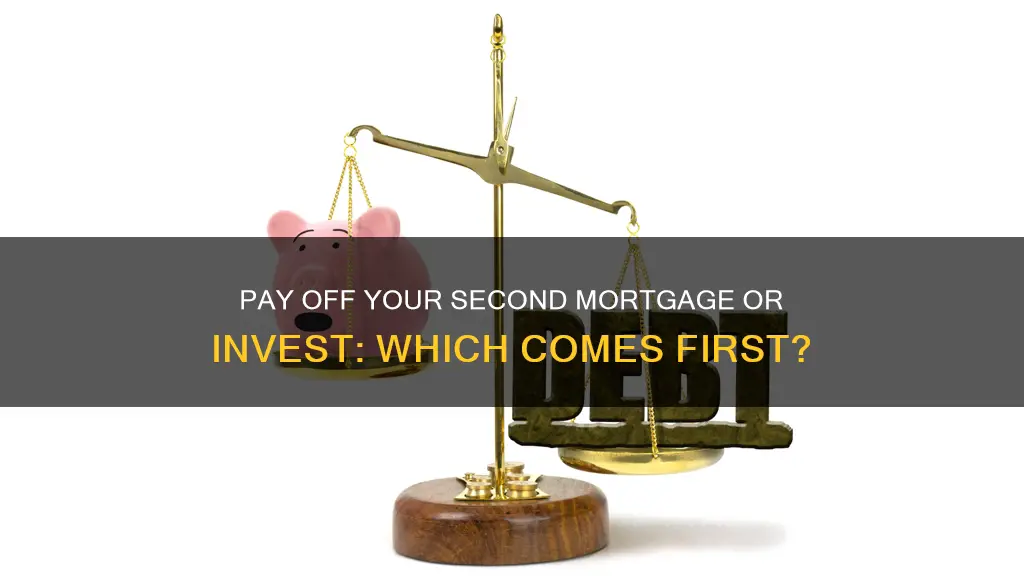
Paying off a second mortgage or investing the money instead is a complex decision that depends on several factors, including an individual's financial situation, risk tolerance, and long-term goals.
From a purely financial perspective, investing extra cash instead of paying off a mortgage early may offer higher returns, especially if the investment outperforms the interest rate on the mortgage. However, investing carries the risk of losses, whereas paying off a mortgage early guarantees interest savings and provides the security of owning a home debt-free.
Other factors to consider include the opportunity cost of having money tied up in an illiquid asset like a house, the potential loss of tax benefits associated with mortgage interest deductions, and the impact on cash flow and monthly expenses.
Ultimately, the decision to pay off a second mortgage or invest depends on an individual's specific circumstances, risk tolerance, and financial goals. Consulting a financial advisor can help make an informed decision that aligns with one's goals and risk appetite.
| Characteristics | Values |
|---|---|
| Interest savings | Paying off your mortgage early can save you thousands or tens of thousands of dollars in interest payments. |
| Peace of mind | Paying off your mortgage early can ease your burden and protect you from the risk of losing your home to foreclosure in the event of a financial emergency. |
| Build equity | Paying off your mortgage faster means building equity in your home more quickly, which can help you qualify for refinancing. |
| Opportunity cost | Any extra money spent on paying down your mortgage faster is money that cannot be used for other financial goals, such as retirement savings or emergency funds. |
| Wealth is tied up | Property is an illiquid asset, meaning you cannot convert it to cash quickly or easily. |
| Loss of tax breaks | Paying down your mortgage instead of maxing out your tax-advantaged retirement accounts will result in the loss of tax deductions. |
| Higher returns | The average stock market returns have been significantly higher than mortgage rates, resulting in higher returns for investors. |
| Liquid investment | Investing in stocks, bonds, and other market investments provides easy access to your money, unlike a home which ties up your wealth. |
| Employer match | Investing extra funds in a retirement account with an employer match provides additional free money through compound earnings. |
| Higher risk | The stock market has more volatility than the housing market, and there is a risk of losing money. |
| Increased debt | Choosing to invest instead of paying off your mortgage means you will continue to have debt and will not own your home outright. |
What You'll Learn
- Paying off a second mortgage early can save you thousands in interest payments
- Investing instead may generate higher returns than the interest cost of a loan
- Paying off a second mortgage can give you peace of mind and reduce stress
- Investing in stocks, bonds and other markets means you can easily sell and access your money
- Paying off a second mortgage may be better if you are close to retirement

Paying off a second mortgage early can save you thousands in interest payments
Paying off your mortgage early can save you thousands in interest payments. The sooner you pay off your mortgage, the less interest you will pay overall.
Let's say you have a 30-year fixed $200,000 loan at a 4.38% rate. That amounts to a lifetime interest charge of $159,485 if you make the usual 12 payments per year. But if you make 13 payments per year, you save $27,216 in interest overall. If you kicked in an extra $200 each month, you'd save $6,000 in 10 years, $50,745 in 22 and a half years, and you'd have the mortgage paid off, too.
If you have a 30-year mortgage of $150,000 with a fixed 4.5% interest rate, you'll pay $123,609 in interest over the life of the loan if you make only the minimum monthly payment. But if you pay $188 more each month, you'll pay off the mortgage in 20 years and save $46,000 in interest.
If you have a 30-year mortgage of $200,000 with a fixed rate of 4.5%, your monthly payments would be $1,013 (not including taxes and insurance), and you'd spend a total of $164,813 in interest over the life of the loan. But if you're able to come up with an extra $300 per month to put toward your mortgage, you'd shave off 11 years and one month from your repayment period and save $67,816 in interest.
If you borrow $200,000 using a 30-year mortgage loan with a fixed interest rate of 3.25%$870 per month (not including taxes and insurance), and you'd pay $113,350 in interest over 30 years. But if you make additional $2,000 payments every month, you'd pay off your mortgage in 6 and a half years and pay only $21,900 in interest over that time. Your total interest savings would be $91,400.
However, it's important to note that this example assumes you stay in the house for the complete loan term and pay off the loan in full, which most homeowners don't do.
It's also worth considering the opportunity cost of paying off your mortgage early. Any extra money you spend on paying down your mortgage faster is money you're not able to use for other financial goals, such as retirement savings or emergency funds.
Additionally, paying off your mortgage early may affect your income taxes. Mortgage interest is tax-deductible if you itemize deductions on your income tax return. Paying off your mortgage debt could eliminate this tax deduction and bump you into a higher tax bracket.
Before making a decision, it's important to consider your financial situation, risk tolerance, and long-term goals. Consult a financial advisor or certified financial planner to determine the best course of action for your specific circumstances.
Telephone Bill Conundrum: Expense or Investment?
You may want to see also

Investing instead may generate higher returns than the interest cost of a loan
Investing your money instead of paying off your second mortgage early may generate higher returns than the interest cost of the loan.
Historical data shows that the average stock market returns have been significantly higher than mortgage rates, meaning you could gain more from the difference. For instance, the S&P 500 has returned an average of 10-11% annually since its inception in 1926 through 2018. In contrast, mortgage rates have been at historic lows in recent years, with 30-year fixed rates ranging from 3% to 4.5%.
If you invest your money instead of paying off your mortgage early, you could benefit from higher returns on your investment compared to the interest saved on your loan. This strategy can be especially advantageous if you have a low-interest mortgage rate.
Additionally, investing in the stock market provides you with a liquid asset. This means that you can easily sell your stocks and access your money if needed. On the other hand, paying off your mortgage early ties up your wealth in your property, which is an illiquid asset. Selling your home to access your equity can be a lengthy and challenging process.
However, it's important to consider the risks associated with investing. The stock market is more volatile than the housing market, and there is a chance you could lose money on your investments. In contrast, paying off your mortgage early guarantees a return on your investment in the form of interest savings.
Ultimately, the decision to pay off your second mortgage or invest depends on your financial situation, risk tolerance, and long-term goals. Consult a financial advisor to help you make the best decision for your specific circumstances.
Apple: A Popular Investment Choice
You may want to see also

Paying off a second mortgage can give you peace of mind and reduce stress
While investing your money may bring higher returns, paying off your mortgage early guarantees a return on your investment. If you pay off your mortgage, you will save thousands or tens of thousands of dollars in interest payments. This is a guaranteed return on your investment, whereas investing in stocks or bonds does not guarantee returns and you could lose money.
Paying off your mortgage early can also reduce your stress and give you peace of mind. If you experience a financial emergency, having a home that is already paid off means you don't have to worry about missing mortgage payments and potentially losing your home to foreclosure. You will still be responsible for property taxes as long as you own the home, but that is a much smaller financial responsibility.
Additionally, paying off your mortgage early can help you build equity in your home more quickly. This can help you qualify for refinancing, which can save you even more money in the long run. You may also be able to leverage your equity in the form of a home equity loan or home equity line of credit (HELOC), which you can use to make improvements that increase your home's value or pay off other higher-interest debt.
However, it's important to consider the opportunity cost of paying off your mortgage early. Any extra money you spend on paying down your mortgage faster is money that you won't be able to use for other financial goals, such as retirement savings or emergency funds. Additionally, property is an illiquid asset, meaning you can't convert it to cash quickly or easily. If you need cash for a financial emergency or investment opportunity, you would need to sell your house, which could take time and may not be possible if the real estate market is performing poorly.
Ultimately, the decision to pay off your second mortgage or invest depends on your financial situation, risk tolerance, and personal preferences. Consult a financial advisor to help you weigh the pros and cons of each option and make the best decision for your circumstances.
Dogecoin: Worthy Investment or Just a Meme?
You may want to see also

Investing in stocks, bonds and other markets means you can easily sell and access your money
Liquidity is an important factor to consider when deciding whether to pay off your second mortgage or invest. Property is an illiquid asset, meaning you can't convert it to cash quickly or easily. If you faced a financial emergency, such as losing your job or an unexpected expense, you would need to take out a home equity loan to liquidate your real estate asset. With stocks, bonds and other market investments, you can sell them more easily and access your money.
However, it's important to remember that the stock market can be volatile, and there are no guarantees of returns. You could lose money investing in stocks or bonds. On the other hand, paying off your mortgage early is a guaranteed return on your investment, as you save on interest payments.
Another factor to consider is your risk tolerance. Investing in the stock market carries more risk than paying off your mortgage early. If you're uncomfortable with the amount of debt you're carrying, putting some money towards your mortgage could help you sleep better at night.
Ultimately, the decision to pay off your second mortgage or invest depends on your financial situation, risk tolerance, and investment goals. Consult a financial advisor to help you make the best decision for your circumstances.
US Investment Trends: Where's the Money?
You may want to see also

Paying off a second mortgage may be better if you are close to retirement
If you are close to retirement, it may be better to pay off your second mortgage first. This is because the opportunity cost of paying off your mortgage early is lower than investing in the stock market. The opportunity cost is the return you could have made by investing your money elsewhere.
When you are close to retirement, it is generally recommended that you reduce your risk and increase your savings. Paying off your mortgage early can help you achieve both of these goals.
Additionally, if you are no longer earning employment income, it may be difficult to make your mortgage payments. By paying off your mortgage early, you can eliminate this expense and reduce your financial burden during retirement.
Another factor to consider is the tax benefits of mortgage interest. If you are close to retirement, you may be in a lower tax bracket and may not benefit as much from the tax deductions associated with mortgage interest.
However, it is important to note that paying off your mortgage early will reduce your liquidity. This means that you may not have as much cash available if you need it for unexpected expenses. Carefully consider your financial situation and risk tolerance before making a decision.
Consulting a financial advisor or certified financial planner can help you make the best decision for your specific circumstances. They can provide personalized advice and guidance based on your risk tolerance, investment goals, and retirement timeline.
Kickstarter: Why People Invest in Ideas
You may want to see also
Frequently asked questions
Paying off your second mortgage first can give you peace of mind, especially if you are debt-averse. It can also help you build equity in your home, which may be useful if you want to refinance.
Paying off your mortgage first means that you are missing out on potential investment opportunities that may offer higher returns. Your money is also tied up in an illiquid asset, and you will lose the ability to take advantage of tax deductions on mortgage interest.
The biggest benefit of investing instead of paying off your mortgage is the potential for higher returns. Your money is also more liquid, and if you invest in a retirement account, you may be able to take advantage of tax benefits and employer matching.
Investing comes with higher risk and volatility. You may also not feel comfortable having debt to your name.
The decision depends on your financial situation, risk tolerance, and long-term goals. Consider factors such as your emergency savings, retirement savings, other debts, income prospects, and expected portfolio returns.







